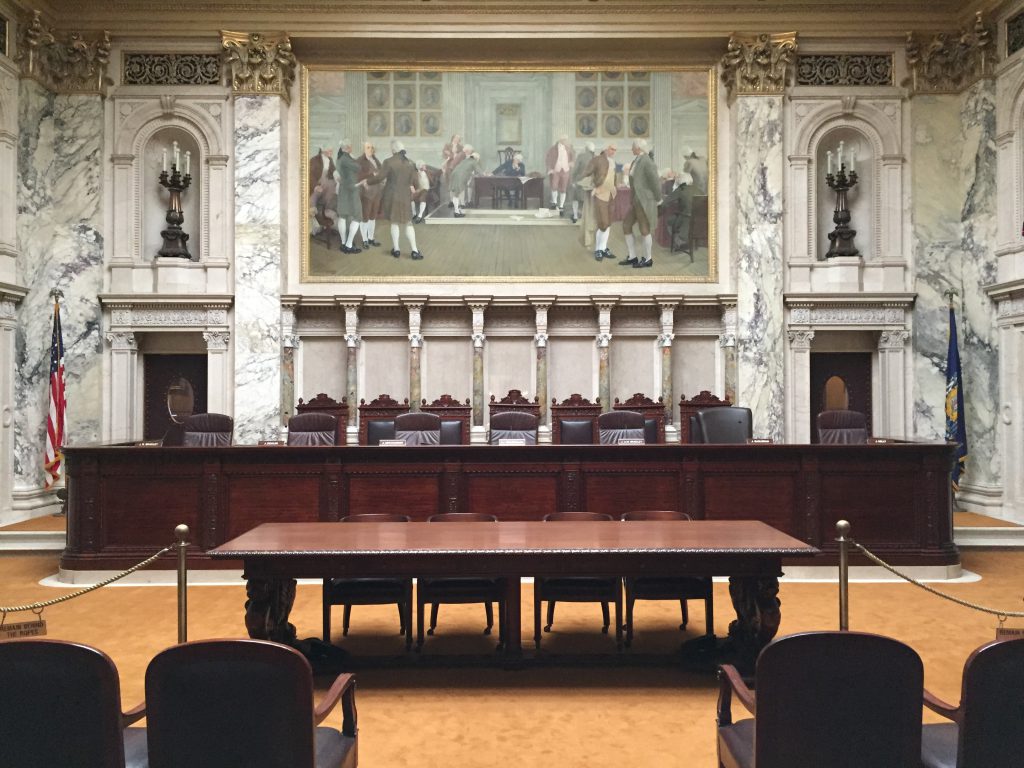Constitutional Boundaries Need Enforcement
Why the Supreme Court should overrule lame duck laws.
On May 15, the Supreme Court will hear arguments concerning the legality of the December 2018 “extraordinary session.” The League of Women Voters of Wisconsin is one of the plaintiffs in this lawsuit. In recent weeks, there have been some misconceptions perpetuated by those who oppose the merits of our case. Here are some facts of the lawsuit:
First, the Wisconsin Constitution does not authorize the Legislature to call itself into an “extraordinary session.” In fact, the Wisconsin Constitution lays out restrictions on the Legislature, including limiting its convening power. This is to ensure legislators act responsibly and honorably when creating laws. The process is also to provide accountability, so the public is given appropriate notice about legislative activity. This is so citizens may engage with the process through review, discussion, and giving input. This is how democracy is practiced. The Legislature did not follow the law in December 2018 when it convened itself through an internal legislative rule.
Despite what some will try and argue, extraordinary sessions are not the way Wisconsin has always operated. Wisconsinites adopted the State Constitution in 1848. It establishes that the Legislature can convene only at times authorized by statute or when the governor calls a “special session.” Last December’s extraordinary session fits into neither category. While it was not the first “extraordinary session,” such sessions are a relatively recent invention of the Legislature; the first was called in 1980.
Wisconsin survived and thrived for more than 130 years without extraordinary sessions. Enforcing the constitutional limitation on when the Legislature can convene will not endanger our state.
Additionally, if the Supreme Court rules that the December 2018 extraordinary session bills are unconstitutional, chaos will not break out. The lawsuit only seeks for a ruling on the bills passed in December 2018. The Legislature operated beyond its constitutional powers to attempt to pass numerous provisions in these bills that undo long-held priorities established by Wisconsin law. Such sweeping changes should not be made without careful consideration of their impacts or without public participation. If the “extraordinary session” in December 2018 is allowed to stand, this hurried, secretive process will lead to further distrust of the government and further abuse of power. If the extraordinary session is ruled unconstitutional, then the bills can be reintroduced inregular session and follow the normal procedure.
Wisconsinites should be able to trust that our elected leaders will respect their obligations and will always act in accordance with the Constitution. The Legislature broke that trust by convening an unconstitutional extraordinary session, increasing their own authority, and constraining executive power. If those governing act outside of their constitutional powers, it is up to the court to enforce those boundaries.
From the onset, the League’s concern with the extraordinary session has not been about partisan politics—it is about upholding the rule of law and requiring the Legislature to act within Wisconsin’s Constitution, to which all elected officials are bound. This is an issue of fairness and of protecting our democracy, the Wisconsin Constitution, and the people of Wisconsin whom our organization serves. Wisconsin voters who prefer fairness and integrity to power and pettiness understand this, and they expect those voted into office to represent the people by governing with fairness and integrity.
Erin Grunze is the executive director of The League of Women Voters of Wisconsin – a nonpartisan political organization that advocates for informed and active participation in government. There are 20 local Leagues throughout Wisconsin. More information at lwvwi.org.
More about the Lame Duck Laws
- Supreme Court Hears Case on Legislature’s Power - Sarah Lehr - Apr 3rd, 2025
- Four Years Later, State’s Lame Duck Law Still Faces Court Challenge - Shawn Johnson - Jan 17th, 2023
- Judge Rules Against Law Giving Legislators Power Over Attorney General Settlements - Shawn Johnson - May 11th, 2022
- State Supreme Court Dismisses AG’s Lame-Duck Lawsuit - Ruth Conniff - Mar 25th, 2021
- Kaul Sues Legislature Over Lame Duck Laws - Melanie Conklin - Nov 24th, 2020
- AG Kaul Announces Legal Action to Allow DOJ to Again Enforce Wisconsin Laws Without Unconstitutional Legislative Interference - Josh Kaul - Nov 23rd, 2020
- Vos Thinks Lame-Duck Session Didn’t Go Far Enough - Melanie Conklin - Jul 31st, 2020
- The State of Politics: Court Rulings Against Evers Sow Confusion - Steven Walters - Jul 20th, 2020
- Court Tosses Dems’ Lame-Duck Suit - Laurel White - Jul 16th, 2020
- Op Ed: State High Court Nullifies 2018 Election - James Rowen - Jul 12th, 2020
Read more about Lame Duck Laws here






















If our State Supreme Court can be impartial in this matter, it will rule against the bogus and partisan lame duck pseudo ligilation.
Correction: the final word of my post should have been pseudo-legislation.